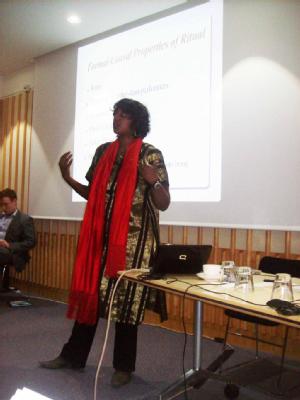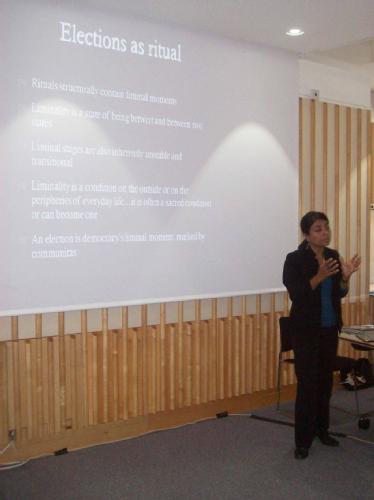Panel 2 – Performance and Politics
| |
|
Bairavee BalasubramaniamTitle: Dramaturgy in the Indian Parliament: Exploring intersections of gender, nation and parliamentary ethos through performances on the floor of the HouseAbstract
I interpret parliamentary rituals as performances of dramaturgical and rhetorical techniques within contexts that rely upon logistical, interpersonal, political, mediatized pre-requisites to be considered successful (i.e. effective, moral, viewed as legitimate, etc.). I understand the process of legislation itself, i.e. the symbolic transformation (acceptance) of a draft into an Act of Parliament is, as a parliamentary ritual, moving beyond a strictly procedural understanding of legislation and exploring instead some of its symbolic and affective dimensions.
In my research, I study the dramaturgy and rhetoric employed within legislative rituals in 2 case studies: the Prevention of Terrorism Act and its Repeal (POTA 2001-2004) and the Women’s Reservation Bill (WRB 1996-present). POTA sought to afford the Indian government with extensive powers that contravened guarantees of civil liberties. WRB is a legislative quota set to reserve 33% of seats for women candidates in the Lowe r House of Parliament – where women currently have 11% representation.
In both cases, the most effective rhetorical appeals (to stall legislation, or to gain political credibility) observed during the debate were appeals to ethos (identity) and pathos (passion). Ethos-based appeals involve ‘other-ing’ other races, religions, nations, castes, gender, etc. and attributing certain qualities/actions/expectations on them. Pathos-based appeals lend themselves to passionate (very often), histrionic appeals, such as: Not passing (or accepting, depending on the speaker’s position) the legislation at hand will ‘destroy’ or ‘endanger’ democracy, the nation and Indian sovereignty. In both cases, MPs using (a combination of) these techniques sought to ‘protect’ the nation, be it from the threat of Islamic extremists, or from an influx of ‘inexperienced’ women MPs in Parliament.
A rhetorical-dramaturgical analysis of ritual performances in the Indian parliamentary context, therefore, renders the concept of ‘procedure’ as ‘over-formalized’, ‘dead ritual’, obsolete. Such analysis also offers theoretical possibilities to re-conceptualize (for instance), notions of parliamentary ethos (vs.?) parliamentary practice, and changing symbolic significance of using the parliamentary floor (as the more technical elements of debates are increasingly worked out within Parliamentary Committees hidden from public view).
|
|
Dr Mukulika BanerjeeTitle: Elections as Social DramasAbstract
Elections are modern India’s most sacrosanct festival. After over six decades of regularly held elections, they have come to occupy the most important non-religious ritual space in the country’s landscape.
In this paper, using the metaphor of a social drama, I will explore how this unique event is created, both by the Election Commission of India and its officials, but also the participants, the voters themselves. I will show how the Model Code of Conduct that comes into operation when elections are announced, ushers in a different temporality to everyday life, suspending the norms of usual conduct to move the country into a different gear of activity. Election materials and campaigns transform the aural and visual landscape of the country, politicians work harder, officials are efficient and voters feel empowered. Election Day itself, is a day of heightened liminality, a moment of classic anti-structure, when popular sovereignty is asserted and power of the rich is humbled, however temporarily.
Elections are therefore classic social dramas, creating an arena when ethics and morals of political life and citizenship are evaluated and asserted in a suspended state of action. This aspect of elections, research shows, is highly valued by voters and goes some way in explaining why voter turnouts in India remain consistently high and why elections have come to be regarded as sacrosanct in contemporary India.
|
|


